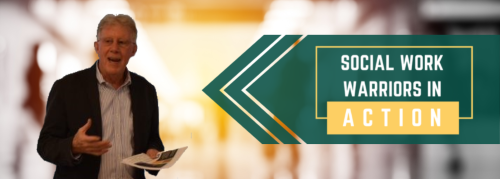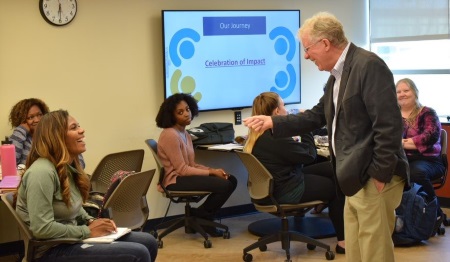Philanthropy October 2018

On Sept. 19, John Van Camp, M.S.W., (above) the immediate past CEO of Southwest Solutions, shared highlights of his over 45-year career in community organizing, advocacy, social administration, management and leadership with Wayne State M.S.W. students taking a graduate level course on Social Work Leadership Strategies (SW7085) taught by adjunct faculty member Marijo Upshaw.
John graduated in the early 1970s from the School of Social Work at Wayne State University. John was fresh out of the SSW's Community Organization program when he began working with other like-minded community organizers and activists to address the unmet mental health needs of the residents of Southwest Detroit. He worked closely with community members including a prominent Catholic church leader to build support for, to develop a service model and to attract funding from the government sources to start a community-based mental health center that would become Southwest Solutions. John's leadership views, and the scope of services provided by the organization, has evolved over the years "from community mental health, to the mental health of the community." John noted that "those we serve often have multiple needs that must be addressed, and we interconnect our services to provide families and individuals the greatest change to succeed and improve their quality of life."
Today, Southwest Solutions, Inc. is a dynamic, nonprofit organization (or as John prefers to call it a "for-impact organization") based in Southwest Detroit that touches the lives of more than 10,000 people annually. The organization provides comprehensive place-based community, social and human development services including mental health and wellness, services for people experiencing homelessness, services for veterans, housing and neighborhood development, education, job training and financial income and asset development, and small business development for communities across metropolitan Detroit.
 "To hear John's start-up story was so inspiring," commented Upshaw. "Students come into the leadership class passionate about a social problem, and they want to develop skills and abilities to be effective human service leaders and systems entrepreneurs. To hear John talk about the humble beginnings of the organization helps students envision the positive difference they can make in people's lives through a model of service leadership like John's."
"To hear John's start-up story was so inspiring," commented Upshaw. "Students come into the leadership class passionate about a social problem, and they want to develop skills and abilities to be effective human service leaders and systems entrepreneurs. To hear John talk about the humble beginnings of the organization helps students envision the positive difference they can make in people's lives through a model of service leadership like John's."
John shared many ways he has employed a strengths-based empowerment model of social work leadership throughout his career including being an "early adapter" of leading-edge practices like recruiting consumers to serve on the governance board of the organization.
John clarified that he prefers the term adapter over the more traditional business term "early adopter" because a place-based model of human services delivery requires that leaders be sensitive to community needs and able to adapt Evidence-Based Practice models to better fit the intended beneficiaries of services.
Upshaw noted, "students really appreciated hearing John's leadership journey, and how as a leader he has integrated nonprofit social enterprise with a commitment to social justice. And the great humility John displays as a leader it's something we can all aspire to emulate."
If you are an alum interested in sharing your story, please contact our Director of Philanthropy Jana McNair at jana.mcnair@wayne.edu or 313-577-4429. Additional information on how you can make an impact in the School of Social Work is available on our website.